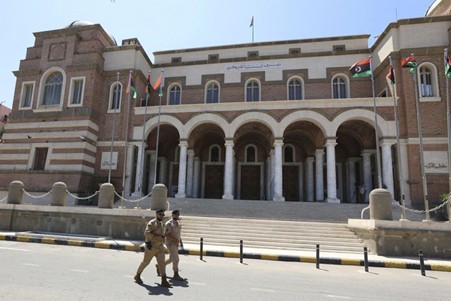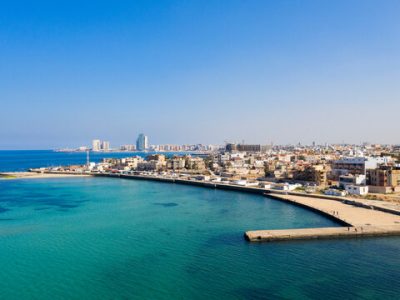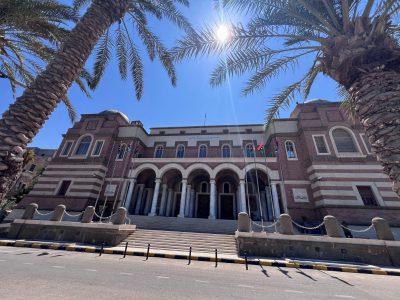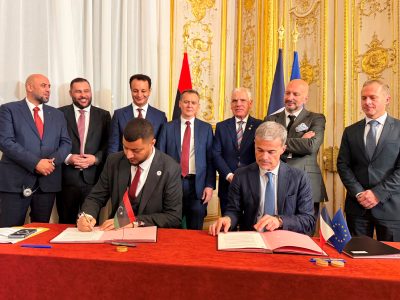Libya’s Central Bank: A Solution or Driver of the Problem?
Since the fall of the Gaddafi regime in 2011, Libya has spiralled into a complex web of civil conflict, political fragmentation, and foreign intervention. At the heart of this enduring chaos lies a paradox: the Central Bank of Libya (CBL) – an institution meant to stabilize the economy and serve all Libyans as a whole – has instead become a financial engine sustaining both sides of the country’s steep political divide. Ostensibly neutral and non-partisan, the CBL is possibly prolonging conflict by funding rival power structures and acting as a shadow broker for Libya’s fractured state.
Who Really Controls the CBL?
The Central Bank of Libya is officially labelled as an independent financial institution wholly owned by the state. The reality is a bit more complex. While the CBL remains headquartered in Tripoli, under the nominal control of the internationally recognized Government of National Unity in the west, it also makes payments to authorities in the east, allied with General Khalifa Haftar’s Libyan National Army (LNA).
This dual-role financing strategy allows the CBL to maintain a fragile economic unity on paper – but in practice, it bankrolls both war machines. The result is a surreal situation: salaries and cash flows across the conflict line, even as these same revenues indirectly support military operations and civil unrest.
Libya’s central bank is one of the few institutions that continues to function across a divided state – not to resolve the divide, but to gloss over it by keeping both sides happy rather than providing incentive to fix the system.
Oil Money and Elite Capture
At the center of this convoluted financial arrangement is Libya’s oil wealth. The National Oil Corporation (NOC), recognized internationally and based in Tripoli, is the sole legal exporter of Libyan crude and the nucleus of the country’s economy. The NOC deposits its revenue into the CBL, in accordance with international agreements. However, critics argue that once inside the bank, these funds become untraceable assets used to finance both governance and warfare without accountability.
One of these critics is GNU-aligned Mohamed al-Menfi, the president of the Libyan’s Presidential Council, who ousted CBL governor Sadiq al-Kabir last August. This move proved to be flammable, as rival authorities in eastern Libya responded by shutting down oil production and exports, causing the nation’s oil economy to take a hit.
By channeling funds to both Tripoli-based factions and Haftar-aligned institutions in the east, the CBL is not just maintaining a semblance of national unity – it’s also fueling the competition for control. Militias, warlords, and political elites in both camps exploit access to the CBL to consolidate power and reward loyalists. In effect, the bank has become less a neutral economic steward and more a mechanism of elite capture – where political actors profit from the country’s oil wealth even as ordinary Libyans face electricity blackouts, food shortages, and currency collapse.
International Recognition, Domestic Dysfunction
Despite these issues, the international community continues to support the unified structure of the CBL and NOC, out of fear that not doing so would lead to even greater chaos. But this well-intentioned stance risks becoming a self-defeating policy. By prioritizing formal unity over meaningful reform, global actors may be enabling the very dysfunction they seek to prevent.
The irony is hard to miss: an internationally recognized oil company delivers revenues to a central bank that then – often indirectly – finances groups undermining that same recognition. In essence, the global framework for managing Libyan oil is upholding a status quo that profits elites while perpetuating division.
What if the NOC Kept Some Oil Revenue?
One of the more pressing questions in Libyan economic policy today is whether the NOC should be allowed to retain a portion of its revenue for reinvestment, infrastructure, or even regional development. One could argue that giving the NOC more financial autonomy could help stabilize operations and improve transparency. More importantly, it could reduce the discretionary power of the CBL, forcing it to act more like a bank and less like a political broker.
However, the skeptical approach warns that such a move could trigger new battles over who controls NOC funds. In a country already torn between east and west, granting revenue autonomy to one arm of the state could deepen mistrust— or offer a template for reform, depending on how it’s implemented.
The Role of Reform
Ultimately, reforming the CBL is essential for any durable peace in Libya. A credible audit of the bank’s finances, stronger oversight mechanisms, and a unified budgeting process are all urgently needed. But such reforms require political will – and that, in turn, means confronting the entrenched interests that benefit from the current chaos.
The Central Bank of Libya is not merely a passive institution operating in a broken state. It is an active player whose decisions shape the incentives and capabilities of Libya’s warring elites. Unless its role is rethought, the bank will remain not a solution, but a driver of the very instability it is supposed to help fix.




